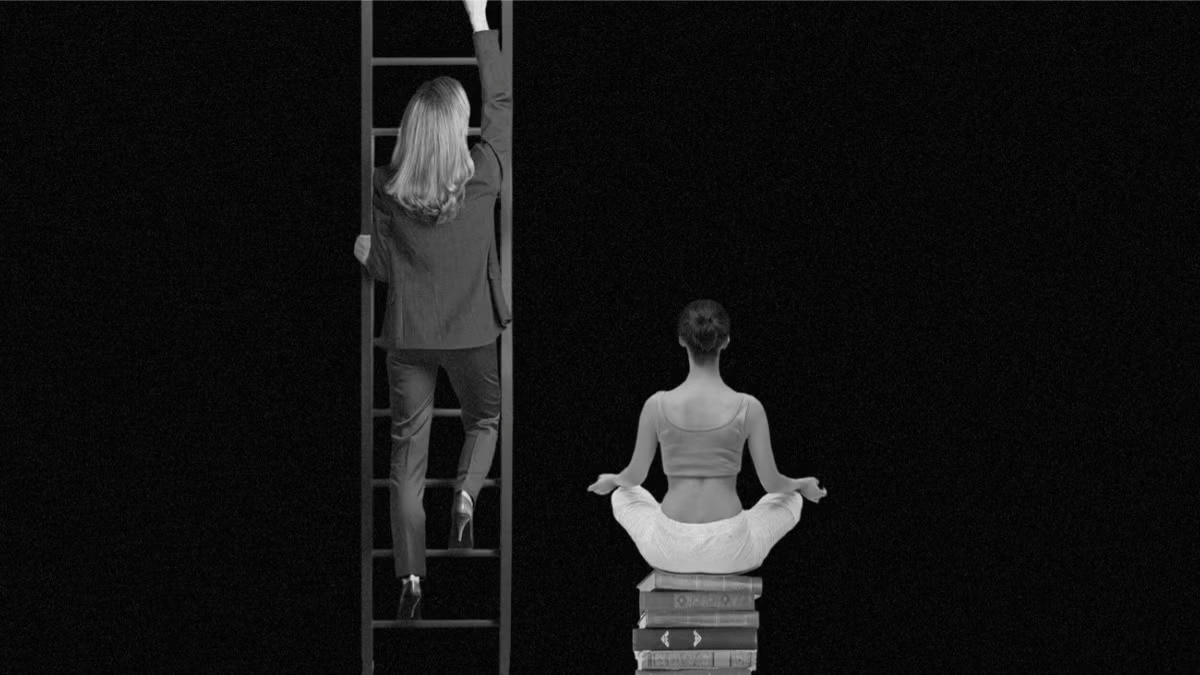Only 6 percent of Gen Z workers want to be the boss
Are we in the midst of an ambition crisis?


According to Deloitte’s 2025 Global Gen Z and Millennial Survey, only 6 percent of Gen Z and millennial workers say their primary career goal is to reach a senior leadership position. On the surface, this may sound like a lack of drive—but it’s not. Instead, it signals a generational shift away from traditional career aspirations toward something more sustainable, balanced, and personally fulfilling.
Career coach Kori Burkholder, who has spent nearly a decade helping early- to mid-career professionals, says she sees the same trend with her clients. “Nobody that I’ve ever worked with is lazy,” she notes. “They’re all ambitious. They all want to work and succeed. It’s just a different kind of success [they’re after] now.”In fact, learning and development rank among the top reasons Gen Zers choose their current employers—just behind work-life balance and career advancement. A full 70 percent of Gen Z workers say they’re actively developing new skills weekly, showing that while the desire to grow and improve is strong, the destination has changed.
Trading Climbing for Balance
For many Gen Z workers, the idea of “climbing the ladder” feels less like progress and more like confinement. For Naydeline Mejia, a 26-year-old freelance writer living in Paris, the statistic initially felt surprising. But with some distance, she says, the shift makes perfect sense. “Growing up, I was taught that the goal was always the classic ‘American dream’: college, secure a corporate job, climb the corporate ladder,” Mejia explains. “Especially being the child of immigrants … what was displayed to me as ‘successful’ by peers and mentors was integrating into corporate America.”
After starting her career in New York’s competitive media industry, Mejia found herself disillusioned. The hustle culture that once seemed empowering eventually felt hollow. Burnout, stagnation, and a lack of personal growth pushed her to reevaluate. “I used to want the senior leadership role or the editor-in-chief title. But now that I live in Paris, I’ve gained a different perspective on work and what success looks like,” she says. “The stereotype is true, in that I do think the culture in the U.S. is ‘live to work,’ and in most of Europe it’s ‘work to live.’ ”
Burkholder notes that Mejia’s shift reflects a larger pattern: “They want to learn, and they want to grow. They want some level of creativity and autonomy, but also mentorship; that’s what I see over and over again.”
Many of her clients, she adds, are less focused on titles and more interested in aligning with their values. “They weren’t aligned with the company’s mission or what they were selling; they want to help people,” Burkholder explains. “That’s a human value. So I help them get clear on how they want to help others based on their skills, passions, and even their life purpose.”
Meija’s definition of success now? “Doing the work I love and getting paid enough to prioritize the things I enjoy, which mostly includes travel, food, and concerts, in addition to being able to pay for basic living necessities like rent.” She continues, “I just want to live a fulfilling life that’s full of new experiences and where I feel like I’m constantly being inspired, challenged, and pushed closer to my life purpose.”
Similarly, Payton Pampinto, 27, left the corporate world just three months ago to join a four-person, female-founded startup, Good PR, a New York–based public-relations company that elevates the people and products changing the world for the better. After chasing promotions early in her career, Pampinto had a realization: “I spent too much time and energy in my first corporate job worrying and strategizing about how to get a title promotion, because that allowed me to get external validation,” she says. “One day it all clicked that a title or someone else’s idea of what success should look like for me does not actually define my success, but my own personal values like peace, intentionality, and individuality do.”
For her, fulfillment now comes from working with intention and aligning her career with her core values: creativity, peace, and authenticity. At Good PR, she feels she’s finally doing work that energizes her rather than drains her. “I could have the same title for the rest of my career, but I’d feel successful if everything I did felt intentional, true to myself, and I felt proud of the work I was doing.”
Redefining the Dream
So why are fewer Gen Z workers aiming for senior roles? According to Mejia, it’s because the corporate system no longer feels secure or rewarding. “We were promised a steady, high-paying job after college, but that’s not the reality for most of my generation, where most of us are still living at home because the cost of living is unbelievably high, we’re not getting hired, or we’re working for low wages,” she shares. “It doesn’t make much sense to strive for a leadership role that may not exist tomorrow.”
Instead of climbing a shaky ladder, Gen Z is focused on building purposeful lives—and careers that support them. “The new dream is to find balance and fulfillment that feels unique to you,” says Pampinto. “I’ve always measured my success by my career goals. But lately, I’m learning how important it is to find a career that allows me to travel, create new hobbies, and nourish relationships while still creating good, intentional work.”
Burkholder sees this drive for balance often. “When people are coming to me, they’re burnt out; they don’t like what they’re doing. They want more freedom and flexibility so they can spend more time on their passion projects outside of work,” she says. “That really creates more balance, like that work-life balance and mental well-being.”
One of the most notable trends Burkholder has observed is a growing desire among her clients to eventually work for themselves. In her view, this doesn’t stem from a lack of direction; it’s about long-term purpose. “If you do have your own business, you are working a lot of the time, but at least you’re working on something that you really care about,” she shares.
What Leadership Needs to Look Like Now
The shift away from traditional leadership aspirations poses an important challenge for employers. If companies want to develop the next generation of leaders, they must first redefine what leadership means—and what it offers.
“To foster future leaders, organizations need to remove the perceived trade-offs between leadership and personal fulfillment,” says Elizabeth Faber, Deloitte’s global chief people & purpose officer. “That means reshaping leadership paths to be more flexible and purpose-driven.”
Burkholder agrees: “It’s more about sustainability, right? And values-aligned leadership paths.” She emphasizes that companies must redefine what leadership looks like to make it more appealing. “The big fear of taking on a promotion or a bigger role is like, ‘Oh, wow, that’s going to become more stress and more responsibility.’ So if companies could create more sustainable roles, with clear boundaries, mentorship, and leadership development, that would help.”
In other words, leadership must evolve into something more than power and prestige. It needs to become inclusive of the values Gen Z workers hold dear—like autonomy, well-being, and continuous learning.
The idea isn’t to reject leadership entirely but to dismantle the outdated narrative that seniority equals success. For some Gen Zers, leadership might still be a future goal, but it’s no longer the pinnacle. Instead, it’s one of many possible ways to contribute meaningfully. “I know that leaving my corporate job for a four-person female-founded startup was a crucial decision in starting to balance out my work and personal life,” Pampinto says, “and for the first time I’m feeling genuinely proud of myself.”
The New “Dream Job”
So what does the new pie-in-the-sky dream look like for Gen Z?
“Finding a job that pays them well enough to fund their interests and hobbies … the things they truly care about outside of work,” says Mejia. “That might look like dismantling the corporate ladder altogether or pursuing less conventional careers that allow for more flexibility and creativity.”
Pampinto agrees. She sees the new dream as building a life—rather than just a résumé. “The new dream is to find balance and fulfillment that feels unique to you,” she says. “When you actually begin experiencing life for what it is, you grow as a human in all aspects.”
Lead image: Collage by Sarah Oliveri
This article originally appeared on Harper'sBazaar.com
Also Read: Why are so many people breaking up with their dream jobs?










